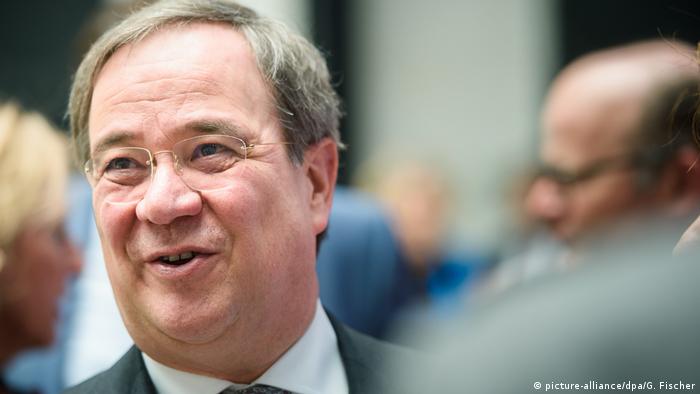
German mega-state votes in test for Merkel's conservatives
All eyes are on Germany's most-populous state North Rhine-Westphalia, where parties face a test ahead of the 2021 national election. Some 14 million people are eligible to vote for mayors in the former industrial hub.
Postal voting was forecast to be high Sunday as North Rhine-Westphalia (NRW) municipalities applied coronavirus pandemic safeguards, including masks in booths and bring-your-own pens.
Some 14 million residents, aged 16 and older and having German citizenship, were eligible to vote in the western German state, which includes the former coal and steel heartland of the Ruhr District.
With Chancellor Angela Merkel set to retire ahead of Germany's 2021 federal, the NRW election is being watched for trends, including forecasted gains for the Greens, and closely run mayoral races in both Dusseldorf, NRW's regional capital, and Aachen.
That city, near Germany's meeting point with Belgium and the Netherlands, is home to Armin Laschet, NRW's Christian Democrat (CDU) premier and a hopeful to replace Merkel.
Read more:
What is the role of Germany's parliamentary opposition?
In surveys, the traditionally trade union-affiliated Social Democrats (SPD), led by Sebastian Hartmann, were expected to retain holds in Dortmund and Duisburg but faced a tough battle in 11 other main cities.
That was despite lengthy campaign tours by the federal SPD's joint leadership, Saskia Esken and Norbert Walter-Borjans.
Pollsters saw Laschet's CDU ahead in city council polls in Dusseldorf, Essen, Munster and Siegen.
Green look to make gains
The Greens, federally in opposition, are favored by young voters. The party could emerge strongly in Bonn and Aachen, where Green Sibylla Keupen could become mayor.
Read more: Coalition agrees to electoral reforms to fend off bloated Bundestag
In Dusseldorf, incumbent SPD mayor Thomas Geisel and the CDU's Stephan Keller were polling neck-in-neck, likely to result in a run-off on September 27.
Cologne, Germany's fourth-largest city, was expected to re-elect mayor Henriette Reker, an independent backed by the Greens and Laschet's CDU, who in 2015 survived a knife attack on election eve.
According to pollster Infratest/dimap, councilor candidates for the far-right Alternative for Germany (AfD) could score in Duisburg, Essen, and Siegen.
Cologne was expecting record postal voting, with some 230,000 applications for papers already submitted, representing a quarter of all eligible city electors.

Olaf Scholz
Plumbing new depths with each election, the SPD decided to run a realist rather than a radical as their top candidate in 2021. Finance Minister Olaf Scholz, a former mayor of Hamburg, is seen as dry and technocratic. Many in his party say the 62-year-old is unlikely to energize party activists and win their hearts.

Markus Söder
Bavaria's 53-year-old state premier from the CDU's more conservative Bavarian sister party, the CSU, has profited in opinion polls from his tough line in the fight against the coronavirus. "Bavaria is strong. Bavaria will grow. Bavaria is solid. Bavaria is safe. Here the world is still in order, and it will stay that way," the former journalist said at the beginning of his tenure in 2018.

Armin Laschet
Armin Laschet, a staunch supporter of Angela Merkel, heads Germany's most populous state. Staunch conservatives routinely underestimated the jovial 58-year-old, famous for his belief in integration and compromise. But recently, his liberal non-interventionist instincts have led to him eating his words more than once during the coronavirus crisis.

Jens Spahn
Health Minister Jens Spahn, the Christian Democrats' rising star, has benefitted from the publicity he gained during the coronavirus pandemic. Openly gay, married, still only 40, with unusually strong English skills, Spahn is a more modern Catholic CDU politician than one could have imagined even a few years ago.

Robert Habeck
50-year-old Robert Habeck, an enthused and passionate speaker, can match the tone and energy of the climate movement in a way many German politicians cannot. But like so many with the gift of the gab, his speeches tend to meander off-topic. Habeck has a Ph.D. in philosophy and was a novelist and children’s author before entering politics almost 20 years ago.

Annalena Baerbock
At not yet 40, Annalena Baerbock has been a Green Party co-chair since 2018. A jurist with a degree in public international law from the London School of Economics, her supporters see her as a safe pair of hands with a better grasp of detail than Habeck. Her opponents point to her lack of governing or ministerial experience and her occasional gaffes in interviews.
Author: Mark Hallam, Rina Goldenberg
At its last communal elections, NRW's postal option was used by 26.5%
Also being elected across NRW on Sunday were county legislatures.
NRW, with a total population of 18 million, children and foreign residents included, has 373 cities, towns, and communities, with 23 larger municipalities, the largest being Cologne, and 31 counties. It is Germany's most populous state.
ipj/rc (dpa, AFP)